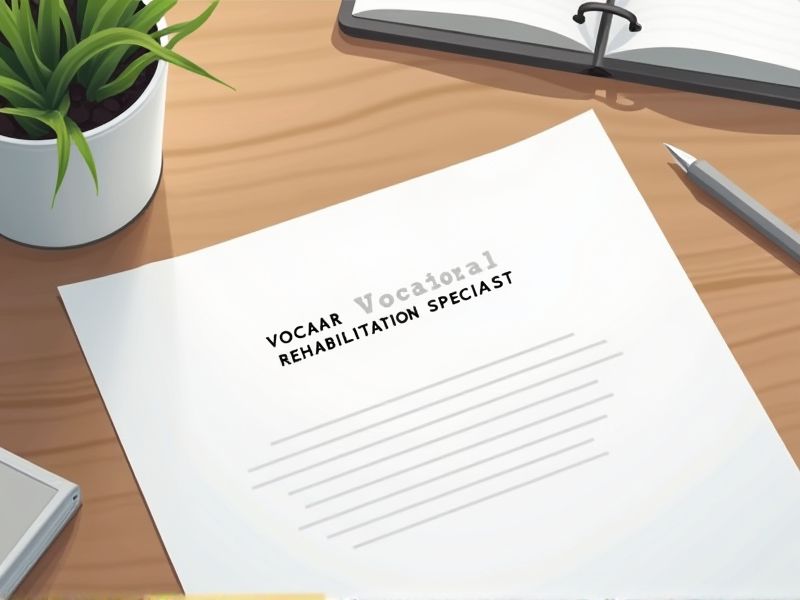
Vocational Rehabilitation Specialists work closely with individuals to help them overcome barriers to employment. Certification ensures they possess the necessary skills and knowledge to design effective rehabilitation plans. Regulatory and industry standards often require specific credentials to safeguard the quality and integrity of services offered. Below are some important certifications required for a Vocational Rehabilitation Specialist.
Certified Rehabilitation Counselor (CRC)
Vocational Rehabilitation Specialists deal with complex rehabilitation cases that require an understanding of disabilities, which a Certified Rehabilitation Counselor is well-equipped to handle. The CRC credential ensures professionals are trained in ethical practices and disability management, promoting quality care. Having CRC certification enhances trust and credibility with clients and employers, leading to better job placement outcomes. Financial constraints in vocational programs necessitate expert guidance, and CRCs can efficiently allocate resources to maximize rehabilitation success.
Licensed Rehabilitation Counselor (LRC)
Licensed Rehabilitation Counselors bring specialized expertise in assessing and addressing the unique needs of individuals with disabilities, which enhances the effectiveness of vocational rehabilitation services. Their training ensures a comprehensive understanding of both physical and psychological barriers, allowing for tailored intervention plans. The requirement of a licensed professional ensures adherence to ethical standards and evidence-based practices in rehabilitative care. Employing LRCs can lead to improved employment outcomes for clients, thereby benefiting both the individual and the workforce.
Certified Disability Management Specialist (CDMS)
Certified Disability Management Specialists (CDMS) provide specialized knowledge in disability management, which enhances the effectiveness of vocational rehabilitation specialists in designing suitable work reintegration plans. Certification through CDMS ensures that rehabilitation specialists stay aligned with the latest practices and evidence-based approaches, improving client outcomes. CDMS holders bring an advanced understanding of workplace accommodations and legal compliance, which is critical for navigating complex rehabilitation scenarios. Vocational rehabilitation specialists with CDMS credentials often gain greater trust from employers and clients, leading to more successful job placements and sustained employment.
Certified Return-to-Work Coordinator (CRWC)
Employers often encounter employees who need structured support to transition back to work after an injury or illness; a Certified Return-to-Work Coordinator (CRWC) offers expertise in managing this process effectively. The CRWC ensures that vocational rehabilitation specialists have a clear plan tailored to each employee's needs, enhancing the likelihood of a successful return to work. They collaborate with healthcare providers, employers, and employees to create safe and feasible work accommodations. The presence of a CRWC reduces the risk of further injury and ensures compliance with legal and organizational standards.
Vocational Rehabilitation Counselor Certification (VRCC)
Vocational Rehabilitation Counselor Certification (VRCC) establishes a standard of competence and knowledge essential for providing effective rehabilitation services. Possession of VRCC increases the credibility of a vocational rehabilitation specialist, leading to greater trust from clients and employers. Certified specialists typically demonstrate higher proficiency in assessing client needs and developing personalized rehabilitation plans. VRCC often aligns with legal and institutional requirements, ensuring specialists are equipped to navigate complex rehabilitation systems.
Certified Vocational Evaluation Specialist (CVES)
Certified Vocational Evaluation Specialists are essential for vocational rehabilitation specialists as they provide comprehensive assessments that guide tailored rehabilitation plans. Their expertise in evaluating skills, interests, and abilities helps match individuals with suitable employment opportunities, enhancing job placement success. By incorporating standardized testing and diagnostic information, CVESs ensure that rehabilitation specialists have an accurate understanding of a client's potential, leading to more effective interventions. Their insights contribute to adaptive strategies and accommodations that improve client outcomes in competitive employment settings.
Certified Assistive Technology Professional (CATP)
Certified Assistive Technology Professionals (CATP) bring specialized knowledge in tech solutions that enhance employability for individuals with disabilities. Their expertise helps vocational rehabilitation specialists identify appropriate assistive devices to support clients' functional independence in the workplace. Collaboration between CATP and rehabilitation specialists increases the likelihood of successful job placements by addressing specific accessibility needs. Certified professionals ensure that rehabilitation strategies integrate the latest technologies, fostering an inclusive work environment.
Certified Employment Support Professional (CESP)
A CESP ensures vocational rehabilitation specialists have the knowledge to effectively assist individuals with disabilities in obtaining employment. The certification provides a standardized skill set, which enhances the quality of support and services offered. Professionals with this credential are recognized for their expertise in navigating employment barriers. Holding a CESP can also increase opportunities for increased funding and collaboration with partner organizations.
Project Management Professional (PMP)
A Project Management Professional (PMP) certification equips a Vocational Rehabilitation Specialist with advanced project management skills, facilitating efficient coordination of rehabilitation plans. It provides frameworks for setting clear goals and timelines, crucial for managing complex rehabilitation processes effectively. PMP certification enhances leadership and communication skills, essential for liaising with multidisciplinary teams and clients. The certification ensures adherence to standardized project management methodologies, minimizing risks and improving the quality of rehabilitation outcomes.
Certified Case Manager (CCM)
The role of a Certified Case Manager (CCM) ensures a standardized approach to patient care, enabling a Vocational Rehabilitation Specialist to deliver consistent outcomes across diverse cases. With the expertise of a CCM, coordination between healthcare providers, clients, and employers is streamlined, reducing gaps in communication. A CCM's training in evidence-based interventions and resource management enhances the vocational rehabilitation process, ensuring clients receive comprehensive support tailored to their needs. Having a CCM involved aids in navigating complex healthcare systems, promoting timely access to services crucial for successful rehabilitation and employment outcomes.
Summary
By obtaining certifications, you as a Vocational Rehabilitation Specialist can enhance your credibility and professional expertise. This enhancement typically results in increased job opportunities and the potential for higher salary prospects. Your new skills can lead to more effective client interactions and improved rehabilitation outcomes. Consequently, employing institutions may recognize your value, increasing your job security and career advancement potential.
